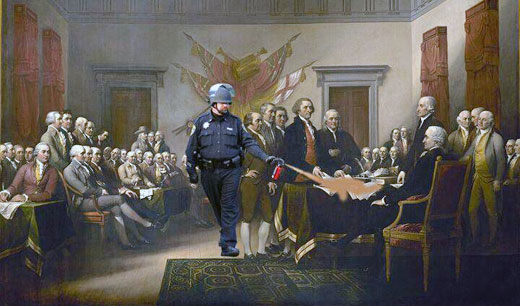
Since Saturday night, millions of Americans have watched blast after blast of pepper spray directed at seated, passively resisting protesters at the University of California, Davis. The chemical was fired into their faces and on their bodies at point-blank range.
Two campus police officers are captured on video spraying the poisonous chemical.
The attack on the protesters was completely unjustified even according to the questionable standards of law enforcement, which allow the chemical’s use in cases of a clear threat to the life and safety of police carrying out legitimate duties.
Criminologists across the country have joined in expressions of outrage, noting that police pepper spray can be even more dangerous than a Taser.
A victim of pepper spray first feels sharp burning and pain and then coughs as breathing becomes more difficult. Soon the victim’s lungs begin to bleed, as was the case with several of the victims at the University of California last weekend.
This is not an isolated incident.
Police in New York used pepper spray on the first day of the Occupy Wall Street protests. When New York’s billionaire mayor eventually evicted protesters from Zuccotti Park, it was supposedly out of concern for public safety.
In Portland, Ore., protesters were hit with pepper spray last week. Photographers captured the horrific image of a young woman having the spray pumped directly into her mouth, nose and eyes.
The same dangerous chemicals were also sprayed on Occupy protesters in Seattle.
We believe that it is time for the federal government to move in and stop what has become a pattern of attacks on the fundamental rights not only of Occupy Wall Street protesters across the country, but on the rights of all Americans to engage in peaceful protest.
This has historical precedent. When workers occupied an auto plant in Flint, Mich., in the 1930s, U.S. troops were sent in to protect the occupiers from the police who were attacking them.
During the upsurge of the civil rights movement in the 1960’s, our government again sent troops in to protect the public against police who used tear gas, water canons and attack dogs against civil rights demonstrators in the South.
As more and more members of the 99 percent majority exercise their rights to public assembly and free speech, we should, in a democracy, expect nothing less.
We are clearly in an era now where protests are becoming a daily, business-as-usual event. This demands a reassessment of how police forces, nationally, need to change the way they behave when “protecting” the “public.” Even the definition of the “public” itself has changed as, more and more, the public and the protesters become one and the same.
One of the big issues for Occupy Davis students is the ceaseless round of tuition hikes resulting from the state’s cuts to education. Previous generations of working-class youth attended that institution for free. Today, the tuition stands at almost $14,000 a year and it is climbing.
On Monday, New York City students at CUNY protesting tuition increases were also victims of police brutality at the Baruch campus.
Students all across America, asking for nothing more than what was granted to generations who came before them, should not have to face the threat of police attacks on their peaceful protests.
There are demands to fire the police chief, the officers involved and the University’s Chancellor at Davis. While we support all of those demands, they are only first steps.
It’s time for our elected leaders to speak out and take action against police brutality. The Justice Department today needs to step in with strict guidelines that protect all the people. And it should investigate the police departments involved for violating protester’s civil rights.
Photo: One of the many pepper spray memes that popped up and went viral, this one depicting spraying at the signing of the Declaration of Independence.












Comments